| Listing 1 - 10 of 18 | << page >> |
Sort by
|
Book
ISBN: 2859191046 Year: 1995 Volume: *1 Publisher: Paris Pensée sauvage
Abstract | Keywords | Export | Availability | Bookmark
 Loading...
Loading...Choose an application
- Reference Manager
- EndNote
- RefWorks (Direct export to RefWorks)
Lexicology. Semantics --- Psycholinguistics --- Body [Human ] (Philosophy) --- Body [Human ]--Philosophy --- Corps humain (Philosophie) --- Corps humain--Philosophie --- Human body (Philosophy) --- Lichaam [Menselijk ] (Filosofie) --- Lichaam [Menselijk ]--Filosofie --- Menselijk lichaam (Filosofie)
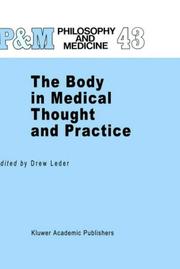
ISBN: 0792316576 9048141400 9401579245 Year: 1992 Volume: vol 43 Publisher: Dordrecht Kluwer
Abstract | Keywords | Export | Availability | Bookmark
 Loading...
Loading...Choose an application
- Reference Manager
- EndNote
- RefWorks (Direct export to RefWorks)
Philosophical anthropology --- Human medicine --- Body [Human ] (Philosophy) --- Body [Human ]--Philosophy --- Corps humain (Philosophie) --- Corps humain--Philosophie --- Human body (Philosophy) --- Lichaam [Menselijk ] (Filosofie) --- Lichaam [Menselijk ]--Filosofie --- Menselijk lichaam (Filosofie) --- Medicine --- Philosophy --- Medicine - Philosophy. --- Body, Human (Philosophy)
Book
ISBN: 3515054308 9783515054300 Year: 1989 Publisher: Stuttgart Franz Steiner Verlag
Abstract | Keywords | Export | Availability | Bookmark
 Loading...
Loading...Choose an application
- Reference Manager
- EndNote
- RefWorks (Direct export to RefWorks)
Body [Human ] (Philosophy) --- Body [Human ]--Philosophy --- Corps humain (Philosophie) --- Corps humain--Philosophie --- Human body (Philosophy) --- Lichaam [Menselijk ] (Filosofie) --- Lichaam [Menselijk ]--Filosofie --- Menselijk lichaam (Filosofie) --- Mind and body --- Esprit et corps --- Body, Human (Philosophy) --- Philosophy, Modern --- #GROL:MEDO-130.14 --- Philosophy --- Philosophy, Modern - 19th century.
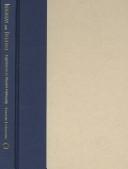
ISBN: 0801436230 080148586X Year: 1999 Publisher: Ithaca London Cornell University Press
Abstract | Keywords | Export | Availability | Bookmark
 Loading...
Loading...Choose an application
- Reference Manager
- EndNote
- RefWorks (Direct export to RefWorks)
Body [Human ] (Philosophy) --- Body [Human ]--Philosophy --- Corps humain (Philosophie) --- Corps humain--Philosophie --- Feminism--Philosophy --- Feminist sociology --- Feminist theory --- Feministische theorie --- Human body (Philosophy) --- Lichaam [Menselijk ] (Filosofie) --- Lichaam [Menselijk ]--Filosofie --- Menselijk lichaam (Filosofie) --- Theory of feminism --- Théorie féministe --- Feminist theory. --- Human body (Philosophy). --- Deleuze, Gilles
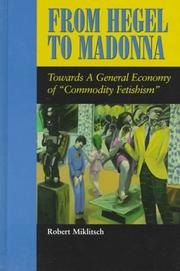
ISBN: 0791435407 Year: 1997 Publisher: Albany, NY : State University of New York [SUNY] Press,
Abstract | Keywords | Export | Availability | Bookmark
 Loading...
Loading...Choose an application
- Reference Manager
- EndNote
- RefWorks (Direct export to RefWorks)
Body [Human ] (Philosophy) --- Body [Human ]--Philosophy --- Corps humain--Philosophie --- Dialectiek --- Fétichisme des produits de consommation --- Lichaam [Menselijk ] (Filosofie) --- Lichaam [Menselijk ]--Filosofie --- Menselijk lichaam (Filosofie) --- Warenfetisjisme --- Popular culture --- History --- 20th century --- Human body --- Social aspects --- Commodity fetishism --- Consumers' preferences --- Philosophy --- Body, Human - Social aspects - History - 20th century. --- Commodity fetishism. --- Consumers' preferences - Philosophy.
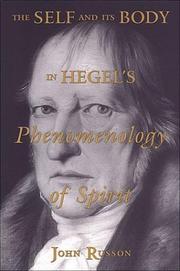
ISBN: 0802084826 0802009190 9786612008511 128200851X 1442682345 9781442682344 9780802084828 Year: 1997 Volume: *7 Publisher: Toronto
Abstract | Keywords | Export | Availability | Bookmark
 Loading...
Loading...Choose an application
- Reference Manager
- EndNote
- RefWorks (Direct export to RefWorks)
A major criticism of Hegel's philosophy is that it fails to comprehend the experience of the body. In this book, John Russon shows that there is in fact a philosophy of embodiment implicit in Hegel's Phenomenology of Spirit. Russon argues that Hegel has not only taken account of the body, but has done so in a way that integrates both modern work on embodiment and the approach to the body found in ancient Greek philosophy.Although Russon approaches Hegel's Phenomenology from a contemporary standpoint, he places both this standpoint and Hegel's work within a classical tradition. Using the Aristotelian terms of 'nature' and 'habit,' Russon refers to the classical distinction between biological nature and a cultural 'second nature.' It is this second nature that constitutes, in Russon's reading of Hegel, the true embodiment of human intersubjectivity. The development of spirit, as mapped out by Hegel, is interpreted here as a process by which the self establishes for itself an embodiment in a set of social and political institutions in which it can recognize and satisfy its rational needs. Russon concludes by arguing that self-expression and self-interpretation are the ultimate needs of the human spirit, and that it is the degree to which these needs are satisfied that is the ultimate measure of the adequacy of the institutions that embody human life.This link with classicism - in itself a serious contribution to the history of philosophy -provides an excellent point of access into the Hegelian system. Russon's work, which will prove interesting reading for any Hegel scholar, provides a solid and reliable introduction to the study of Hegel.
Body [Human ] (Philosophy) --- Body [Human ]--Philosophy --- Cogito --- Corps humain (Philosophie) --- Corps humain--Philosophie --- Human body (Philosophy) --- Ik (Filosofie) --- Lichaam [Menselijk ] (Filosofie) --- Lichaam [Menselijk ]--Filosofie --- Menselijk lichaam (Filosofie) --- Moi (Philosophie) --- Self (Philosophy) --- Body, Human (Philosophy) --- Hegel, Georg Wilhelm Friedrich, --- Philosophy --- Hegel, Georg Wilhelm Friedrich --- Phänomenologie des Geistes (Hegel, Georg Wilhelm Friedrich) --- Phenomenology (Hegel, Georg Wilhelm Friedrich) --- Phenomenology of mind (Hegel, Georg Wilhelm Friedrich)
Book
ISBN: 2707315494 9782707315496 Year: 1996 Publisher: Paris Minuit
Abstract | Keywords | Export | Availability | Bookmark
 Loading...
Loading...Choose an application
- Reference Manager
- EndNote
- RefWorks (Direct export to RefWorks)
La fatigue forme un phénomène fondamental de l’existence. Elle met en effet en jeu le rapport de l’homme à ses œuvres et à son corps, au temps et à la mort, au sens et à l’être. L’histoire de la pensée l’atteste qui, des Grecs à la philosophie contemporaine, en passant par le judaïsme et le christianisme, n’a cessé de la méditer. Ce livre décrit ses multiples manifestations, et les enjeux dont elle est lourde. Mais s’agit-il toujours de la même fatigue, ou a-t-elle une histoire, si ce n’est un destin ? L’histoire de la fatigue n’est-elle pas l’histoire du corps ?
Philosophical anthropology --- Being --- Body [Human ] (Philosophy) --- Body [Human ]--Philosophy --- Corps humain (Philosophie) --- Corps humain--Philosophie --- Etre (Philosophie) --- Human body (Philosophy) --- Lichaam [Menselijk ] (Filosofie) --- Lichaam [Menselijk ]--Filosofie --- Menselijk lichaam (Filosofie) --- Ontologie --- Ontology --- Zijn (Filosofie) --- Zijnsleer --- Fatigue --- --Philosophie --- --Fatigue --- History --- Body, Human (Philosophy) --- -Ontology --- Philosophy --- Metaphysics --- Necessity (Philosophy) --- Substance (Philosophy) --- Exhaustion --- Lassitude --- Tiredness --- Weariness --- Physiology --- Symptoms --- Rest --- Ermüdung. --- Fatigue. --- Filosofische aspecten. --- Human body (Philosophy). --- Ontology. --- Philosophie. --- Vermoeidheid. --- Aspect religieux. --- History. --- Philosophie --- Fatigue - History --- Corps (philosophie) --- Esprit et corps
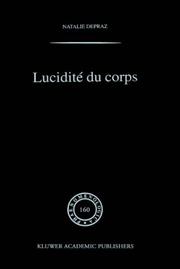
ISBN: 0792369777 9780792369776 Year: 2001 Volume: 160 Publisher: Dordrecht Kluwer Academic
Abstract | Keywords | Export | Availability | Bookmark
 Loading...
Loading...Choose an application
- Reference Manager
- EndNote
- RefWorks (Direct export to RefWorks)
Du fait de son impulsion transcendantale, l'analyse husserlienne du corps vivant et vécu entendu comme corps charnel a été congédiée par maints phénoménologues et par la plupart des exégètes de Husserl au titre de sa soi-disante incapacité à rendre compte à partir de là de la relation intime et quotidienne que nous entretenons avec nous-mêmes et avec les autres. A rebours de cette thèse largement répandue, je souhaite montrer combien la phénoménologie husserlienne contient en elle des ressources descriptive méconnues, qui libèrent l'espace d'un compte rendu détaillé de notre expérience corporelle et charnelle, tout aussi bien individuelle que communautaire, et ce, à son niveau transcendantal rigoureux.Le propos de Lucidité du corps réside dès lors dans la confrontation entre une telle analyse et les descriptions récentes des différentes dimensions du corps telles qu'elles se déploient de plus en plus dans les champs empiriques récents (neurobiologie émergente, éthologie, psychologie de l'enfant, psychopathologie, sociologie compréhensive et ethnologie), ce qui permet d'ouvrir la voie à une analyse renouvelée de notre chair en tant que dotée de ludicité plutôt que comme grevée d'opacité passive. A la différence de Merleau-Ponty, de P. Ricoeur et de J. Derrida, je maintiens fermement la contrainte transcendantale de l'expérience phénoménologique de la chair, mais, contrairement à une version de la transcendantalité formelle inspirée par l'héritage kantien, je revendique la possibilité d'un empirisme transcendantal à titre de cadre philosophique pour la démarche phénoménologique.
History of philosophy --- Theory of knowledge --- Husserl, Edmund --- Body [Human ] (Philosophy) --- Body [Human ]--Philosophy --- Corps humain (Philosophie) --- Corps humain--Philosophie --- Fenomenologie --- Human body (Philosophy) --- Lichaam [Menselijk ] (Filosofie) --- Lichaam [Menselijk ]--Filosofie --- Menselijk lichaam (Filosofie) --- Phenomenology --- Phénoménologie --- Phenomenological psychology --- Mind and body --- Psychologie phénoménologique --- Esprit et corps --- Husserl, Edmund, --- Body, Human (Philosophy) --- Phenomenology. --- Phenomenologie --- Psychologie phenomenologique --- Philosophy, Modern --- Philosophy --- Human body (Philosophy). --- Phénoménologie --- Psychologie phénoménologique --- Phenomenological psychology. --- Mind and body.

Abstract | Keywords | Export | Availability | Bookmark
 Loading...
Loading...Choose an application
- Reference Manager
- EndNote
- RefWorks (Direct export to RefWorks)
Body [Human ] (Philosophy) --- Body [Human ]--Philosophy --- Chinese filosofie --- Chinese philosophy --- Comparative philosophy --- Corps humain (Philosophie) --- Corps humain--Philosophie --- East and West --- Filosofie [Chinese ] --- Filosofie [Vergelijkende ] --- Human body (Philosophy) --- Lichaam [Menselijk ] (Filosofie) --- Lichaam [Menselijk ]--Filosofie --- Menselijk lichaam (Filosofie) --- Oosten en Westen --- Orient et occident --- Philosophie chinoise --- Philosophie comparée --- Philosophy [Chinese ] --- Philosophy [Comparative ] --- Vergelijkende filosofie --- Philosophy, Chinese --- Philosophy, Comparative --- Body, Human (Philosophy) --- Civilization, Western --- Civilization, Oriental --- Occident and Orient --- Orient and Occident --- West and East --- Asian influences --- Oriental influences --- Western influences --- Philosophy --- Eastern question
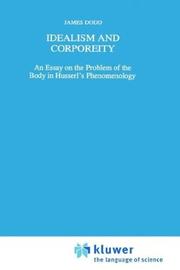
ISBN: 0792344006 9401063869 9401156581 9780792344001 Year: 1997 Volume: 140 Publisher: Dordrecht Kluwer
Abstract | Keywords | Export | Availability | Bookmark
 Loading...
Loading...Choose an application
- Reference Manager
- EndNote
- RefWorks (Direct export to RefWorks)
In a way, the problem of the body in Husserl' s writings is relatively straightfo r ward: it is an exercise in faithful description and elaboration of a sense or mean ing, that of the "lived body," using the tools and methods of intentional analysis. What is to be described is nothing exotic, but a recognizable, familiar element of experience; further, it is not something limited to any special type of experience, but is ever-present, whether it is in the background or the center of attention. Thus the lived body is, in a way, the most mundane of topics in phenomenology, to be du1y noted as a matter of course--of course we should include the body in the analysis of lived space; of course the body is an element in the consciousness of other persons. Along with the obviousness of the task is the impression that, at least at the outset, the problem of the body does not appear to tax the resources of intentional analysis, forcing us to raise critical questions about the scope and limits of phenomenological philosophy. There is nothing extreme about the problem of the body-it demands neither that we discern structures of the end most interior of consciousness, as does the study of "internal time conscious ness," nor does it calion us to fix the sense of the normativity that constitutes the "logic" of the world by grounding it in an absolute foundation.
Philosophical anthropology --- Husserl, Edmund --- Body [Human ] (Philosophy) --- Body [Human ]--Philosophy --- Corps humain (Philosophie) --- Corps humain--Philosophie --- Fenomenologie --- Human body (Philosophy) --- Lichaam [Menselijk ] (Filosofie) --- Lichaam [Menselijk ]--Filosofie --- Menselijk lichaam (Filosofie) --- Phenomenology --- Phénoménologie --- Mind and body --- Philosophy, German --- Esprit et corps --- Philosophie allemande --- Husserl, Edmund, --- Body, Human (Philosophy) --- Phenomenology. --- Philosophy, Modern --- Philosophy --- -Contributions in philosophy of history --- Human body (Philosophy). --- Phénoménologie --- -Husserl, Edmund --- Husserl, Edmond --- Contributions in philosophy of history --- Contributions in philosophy of the human body --- Phenomenology . --- Epistemology. --- Ontology. --- Being --- Metaphysics --- Necessity (Philosophy) --- Substance (Philosophy) --- Epistemology --- Theory of knowledge --- Psychology --- Husserl, Edmund, - 1859-1938 --- Husserl (edmund), philosophe allemand, 1859-1938 --- Corps humain --- Critique et interpretation
| Listing 1 - 10 of 18 | << page >> |
Sort by
|

 Search
Search Feedback
Feedback About UniCat
About UniCat  Help
Help News
News